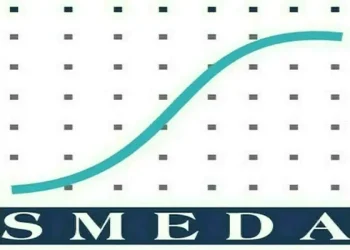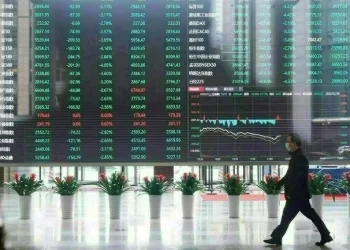Most stock markets in the Gulf slipped in early trading on Thursday on more hawkish-than-expected minutes of the US Federal Reserve’s latest policy meeting, while muted oil prices also weighed on sentiment.
Fed officials at their April 30-May 1 session indicated they still had faith that price pressures would ease, if only slowly, but the meeting minutes also reflected a discussion of possible tightening.
Most Gulf currencies are pegged to the dollar, and any US monetary policy change is usually mimicked by Saudi Arabia, the United Arab Emirates and Qatar.
The Qatari benchmark index was down 0.7%, pressured by a 1.1% drop in Industries Qatar and a 1.4% loss in Qatar Navigation. Dubai’s benchmark stock index slipped 0.6%, weighed down by losses in almost all sectors.
The blue-chip developer Emaar Properties fell 1.2% and Emirates NBD, the emirate’s largest lender, shed 0.6%. In Abu Dhabi, the benchmark stock index fell 0.6% with Aldar Properties sliding 1% and conglomerate Alpha Dhabi Holding declining 4.7%. ADNOC Drilling climbed 3.2%.
Parent energy major ADNOC said on Thursday it raised $935 million from an additional 5.5% sale of shares in ADNOC Drilling to institutional investors.
Most major Gulf bourses drop, Abu Dhabi hits two-year low
Saudi Arabia’s benchmark stock index dropped 0.5%, with Banque Saudi Fransi dropping 3.7% and Saudi Arabian Mining falling 1.4%.
Riyadh Cables and Makkah Construction, however, advanced 6.3% and 2.5%, respectively.
Oil prices, a catalyst for the Gulf’s financial markets, eased for a fourth straight session, with Brent down 0.2% at $81.76 a barrel by 0805 GMT.
Most stock markets in the Gulf slipped in early trading on Thursday on more hawkish-than-expected minutes of the US Federal Reserve’s latest policy meeting, while muted oil prices also weighed on sentiment.
Fed officials at their April 30-May 1 session indicated they still had faith that price pressures would ease, if only slowly, but the meeting minutes also reflected a discussion of possible tightening.
Most Gulf currencies are pegged to the dollar, and any US monetary policy change is usually mimicked by Saudi Arabia, the United Arab Emirates and Qatar.
The Qatari benchmark index was down 0.7%, pressured by a 1.1% drop in Industries Qatar and a 1.4% loss in Qatar Navigation. Dubai’s benchmark stock index slipped 0.6%, weighed down by losses in almost all sectors.
The blue-chip developer Emaar Properties fell 1.2% and Emirates NBD, the emirate’s largest lender, shed 0.6%. In Abu Dhabi, the benchmark stock index fell 0.6% with Aldar Properties sliding 1% and conglomerate Alpha Dhabi Holding declining 4.7%. ADNOC Drilling climbed 3.2%.
Parent energy major ADNOC said on Thursday it raised $935 million from an additional 5.5% sale of shares in ADNOC Drilling to institutional investors.
Most major Gulf bourses drop, Abu Dhabi hits two-year low
Saudi Arabia’s benchmark stock index dropped 0.5%, with Banque Saudi Fransi dropping 3.7% and Saudi Arabian Mining falling 1.4%.
Riyadh Cables and Makkah Construction, however, advanced 6.3% and 2.5%, respectively.
Oil prices, a catalyst for the Gulf’s financial markets, eased for a fourth straight session, with Brent down 0.2% at $81.76 a barrel by 0805 GMT.










 American Dollar Exchange Rate
American Dollar Exchange Rate